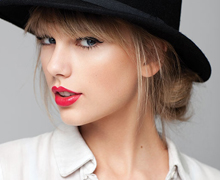By Nicole Russell | How do I love Taylor Swift? Let me count the ways. She writes upbeat music that triggers romantic nostalgia, she gives generously to her fans, and she lays the smackdown on super-successful companies who try to implement socialist policies on the sly.
What’s more, she does it in a straightforward manner, full of taste and grace. Behold the ways Swift makes me think she’s really a supply-side economist—nay, a pro-business-loving capitalist—in real life and this whole superstar musician thing is just, like, a side-gig.
1. Taylor Swift Is Generous
Swift is regularly and generously philanthropic with her time and money—which is a predominant feature of free-market societies compared with socialist ones, as well as free-market supporters versus antagonists. Swift recently started her “1989” world tour. Not only does she perform several sets for several hours, she invites her best friends—who happen to be famous, like Nick Jonas, Lorde, Heidi Klum, Jason Derulo, and the U.S. Women’s National Soccer Team—to sing, dance, and hang out with her on stage. In sharing her stage, concert-goers get two shows for the price of one. Fans love it.
Recently Swift donated $50,000 to an 11-year-old fan with leukemia, and a few weeks ago she gave $15,000 to a firefighter who arrived on the scene of a car accident only to find his wife and child were the victims. Contrary to popular belief, a common denominator among capitalists is their generosity. It’s mutually beneficial, not only for the giver, but the receiver, not to mention the economy and society.
2. Taylor Swift Knows Her Worth
Swift recently penned a note via her Tumblr: “To Apple, Love Taylor.” In it, she said she was going to withhold her album, “1989,” from their new streaming service, Apple Music. She opined about Apple Music’s decision to offer a free three-month trial to new subscribers. That didn’t bother her. What did was that “Apple Music will not be paying writers, producers, or artists for those three months.” She found this to be “shocking, disappointing, and completely unlike this historically progressive and generous company.”
Immediately, Swift pointed out something that sounds like common sense. “We know how astronomically successful Apple has been and we know that this incredible company has the money to pay artists, writers and producers for the 3 month trial period…even if it is free for the fans trying it out.” While touting Apple’s incredible success—Forbesestimates Apple is worth $742 billion—Swift says the musical efforts of especially up-and-coming artists are still worthsomething.
Sure, she shrugged, offer potential customers free streaming music if you want, but to turn around and expect said musicians who wrote, performed, and produced that music to give it away? Sounds kind of like a reverse Robin Hood: Robbing the poor to feed the rich. Making money this way might make Apple a buck or two, but by forcing musicians rather than negotiating with them in a free exchange. Swift isn’t dumb and wasn’t having any of it.
3. Taylor Swift Persuades Instead of Forcing
Swift explained why this just didn’t make sense for her and her peers, especially in light of Apple’s financial bandwidth. “This is not about me […] This is about the new artist or band that has just released their first single and will not be paid for its success. This is about the young songwriter who just got his or her first cut and thought that the royalties from that would get them out of debt.”
Her note closes with this gem: “Three months is a long time to ask people to go unpaid, and it is unfair to ask anyone to work for nothing. We don’t ask you for free iPhones. Please don’t ask us to provide you with our music for no compensation.” I can hear Apple now: “That darn Taylor Swift—so nice, thinking about others, and so darn practical about money!
To a capitalist, work begets profit, profit begets more work, which begets more jobs, which fuels the economy which….you see the brilliant cycle. Swift articulates in one paragraph why socialism caused Eastern Europe to collapse. Her work, and the work of her peers, has value to their fans. When she begins to offer for free a product that people used to pay for, the value of her product dips and eventually dissipates. Then Swift would be what we call S.O.L. and out looking for work. Or, as Ayn Rand said, “A society that robs an individual of the product of his effort…is not strictly speaking a society, but a mob held together by institutionalized gang violence.”
In other words, people negotiate and persuade within a free-market society, and only exchange if both parties agree they’re making a fair trade. Under socialism, people are coerced and therefore exploited.
4. Taylor Swift Isn’t a (Rhymes With ‘Witch’)
Some people think capitalists are all greed and no heart. All bottom line and no middle ground. In her note, which was thorough and pointed, Swift proved you can be both business-savvy and articulate, if not kind and complimentary. Swift could have utilized Twitter and her $59 million (!!) followers and spewed, in a few characters, some snarky, rude points about how Apple is robbing her and other musicians of their hard-earned pay. Instead, she took to a longer form, Tumblr, and wrote a note where she utilized the hamburger effect of criticism: Compliment, critique, compliment.
She told Apple it was “historically generous and progressive,” “successful,” that she “respects,” “admires,” “reveres,” and “loves” the company. Swift doesn’t lay it on so thick it seems insincere. Instead, it seems she really does think highly of Apple and isn’t just saying so to try to achieve her desired result. See, pro-business capitalists: You don’t have to be a super-rude person to get what you want.
The New Yorker’s tagline put it succinctly: After asking Apple nicely, Taylor Swift has won the only battle on planet Earth in which she might have been the underdog. Speaking of underdog, as Swift points out, she can provide for her, her band and crew by playing live shows, but few musicians are as wildly successful as she. Still, Swift speaks up for them, even when they have no voice. You have to admire a successful businesswoman who uses her platform for good. And what gave Swift that power? You and I and everyone else who buys her albums and visits her shows. Swift only has power because we gave it to her. And we give it to her because we like how she uses that power. That’s how the free market works.
5. Free Exchange Benefits Everyone
Apple didn’t get Swift’s note and hold a bunch of board meetings to see if they could maybe accommodate her request. That very same day, in what could have been the public-relations disaster of a lifetime, Apple owned its mistake. Eddy Cue, an Apple senior vice president who oversees the company’s music operations, tweeted to Swift that artists would get paid for streaming, even during Apple Music’s free trial period. Star power combined with pro-capitalist ideas equated to some fantastic results for musicians of all levels of success.
Dr. Walter Williams, a renowned professor of economics at George Mason University and syndicated columnist, told me via e-mail this “helps to prove that when there are capitalist forces at work that even the largest businesses cannot get away with running roughshod over workers and customers.”
Since then, media from Rolling Stone to Vanity Fair have applauded Swift’s chutzpah and ability to influence a corporate giant with a small but mighty Internet note. As is typical of the business-savvy woman she has become, Swift tweeted a few polite acknowledgements and went on to doing what she does best. Regardless, I get the impression that, even if Apple hadn’t acquiesced so quickly, Swift would have still found a way to promote her music, her business, and social cooperation: the often unseen foundation of that beautiful, ticking clog of free-market capitalism.
If you found this blog post of interest, you might want to explore these Free Think University courses:
For this third party post in its full context, please go to:
5 Things Taylor Swift Teaches Us About Capitalism
© 2015. The Federalist. www.thefederalist.com














